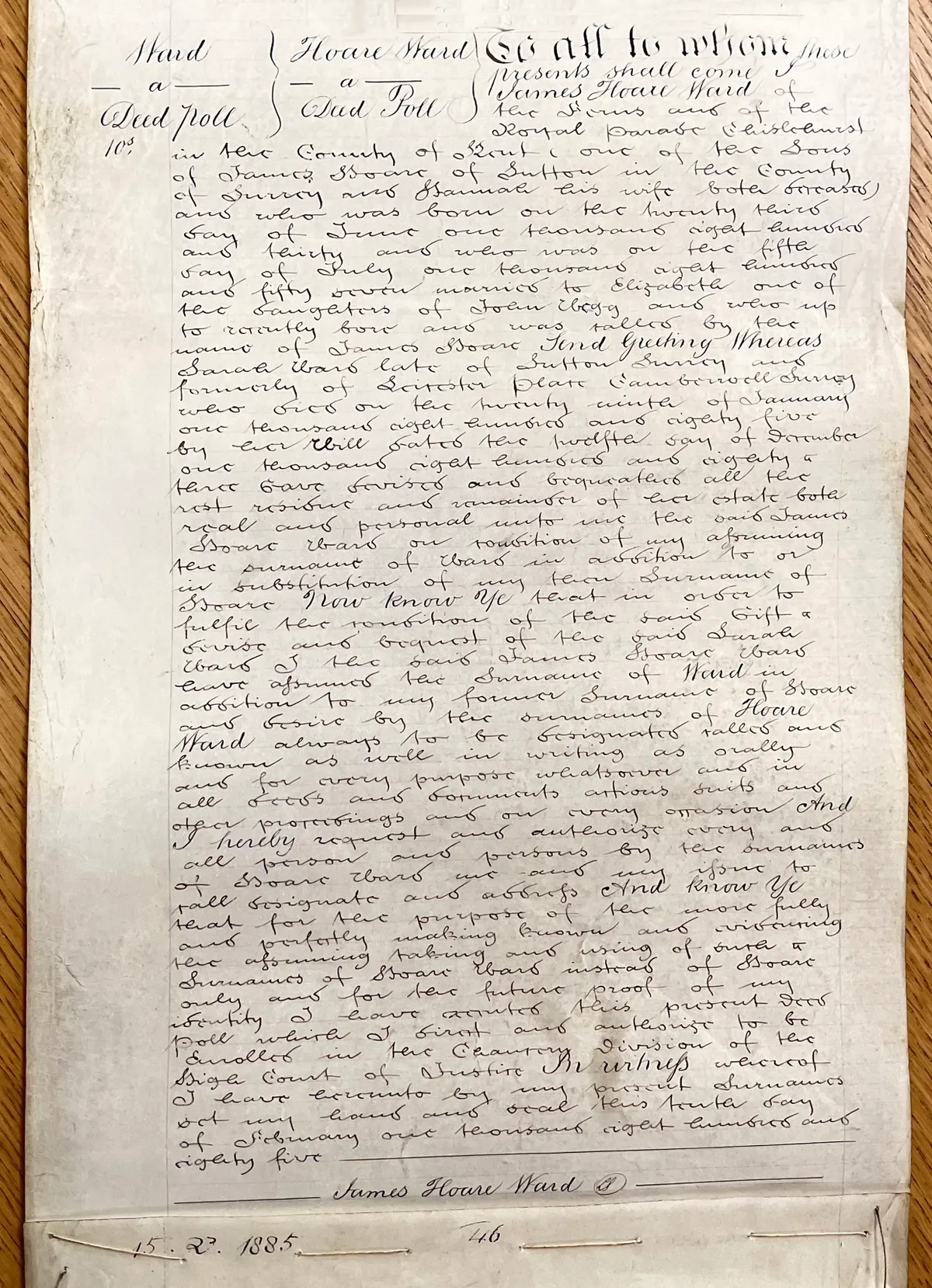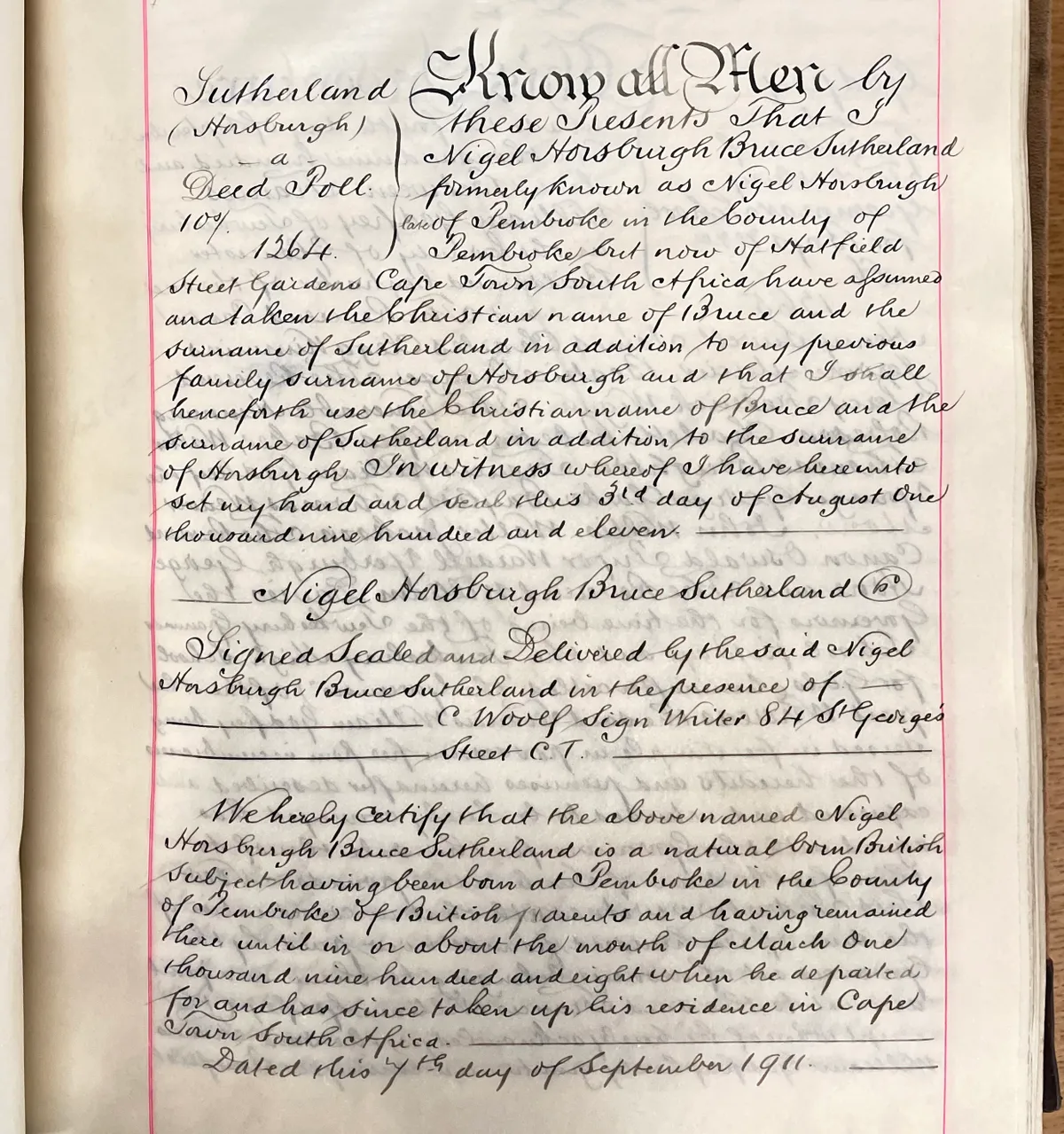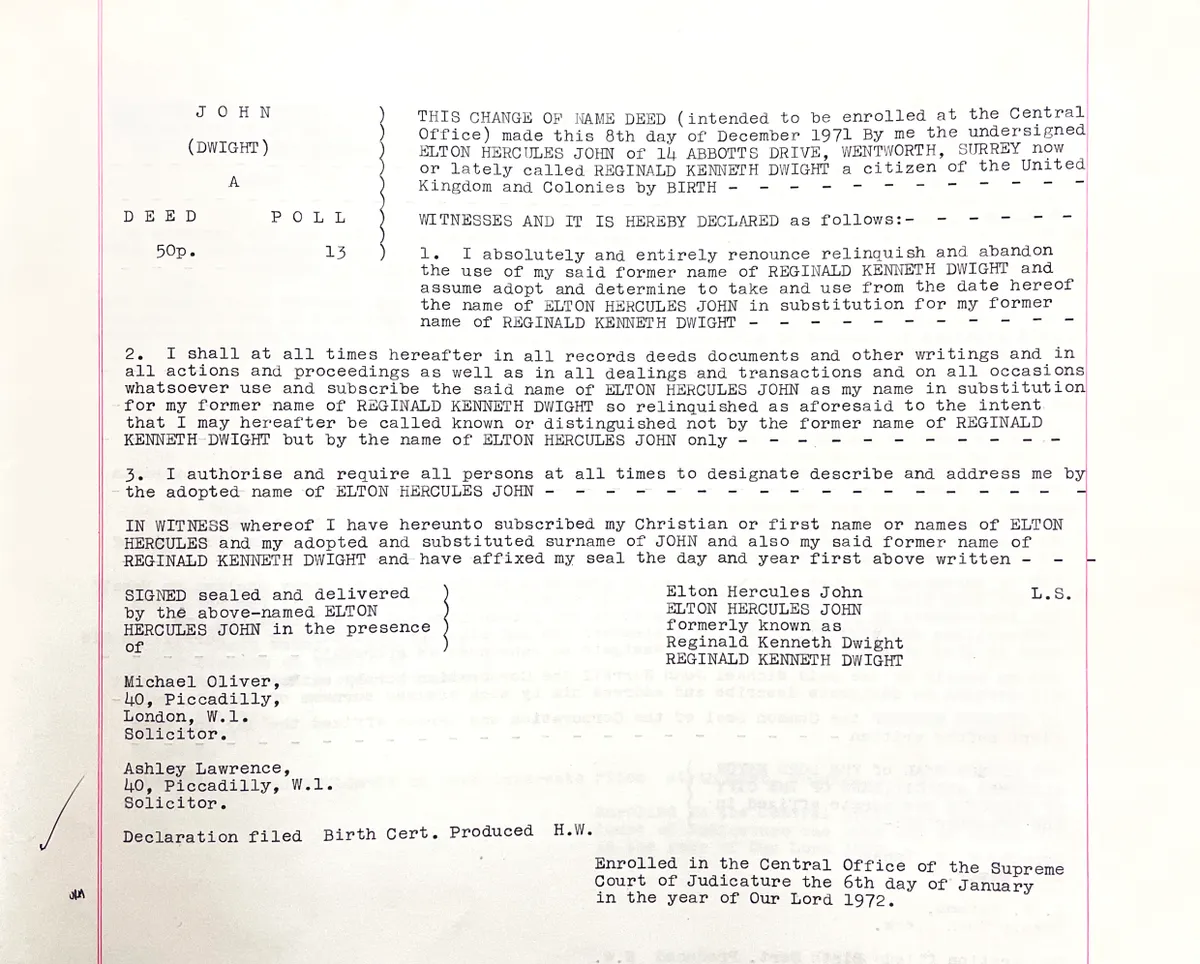English common law has always allowed a person to take and use a new surname. This could be done, perfectly lawfully, without drawing up any formal record. The majority of our ancestors who changed their names did so without a legal record, but some name change records are available.
Name change records: Royal licence
There are records of change of name by royal licence from the late 17th century, and this was common during the 18th and 19th centuries. In later years, changes of name by royal licence were mostly restricted to the instances when a bequest or marriage settlement was conditional on a change of name taking place; or, as had always been the case, when a modification to a coat of arms was also required. Note that a royal licence could only be used to change a surname.
A small number of warrants for changes by royal licence are held at The National Archives in Kew (TNA). Before 1782 they are in series SP44; from 1782 to February 1868 in HO38; and from February 1868 onwards in HO142. Most of the volumes have internal indexes.
There is also correspondence: from about 1841 to 1871, ‘Home Office: Registered Papers’ (with some others to 1950), in series HO45; others, 1868 to 1959, ‘Home Office: Registered Papers, Supplementary’ are in HO144 – these are surname-indexed in TNA’s online catalogue Discovery, and also include petitions that were ultimately refused.
Since 1773, all applications for change of name under royal licence have been referred to the College of Arms, the official heraldic authority for England, Wales and Northern Ireland, or application may have been made there initially. Arms granted to one family can only be transferred to another person not in legitimate male line of descent from the original grantee by means of a royal licence, followed by an exemplification of the arms. A resulting royal licence and any subsequent exemplification of arms must be recorded in the official registers of the College of Arms to be valid. The records held by the College of Arms may therefore contain additional information to that at TNA.
Name change records: Old newspapers
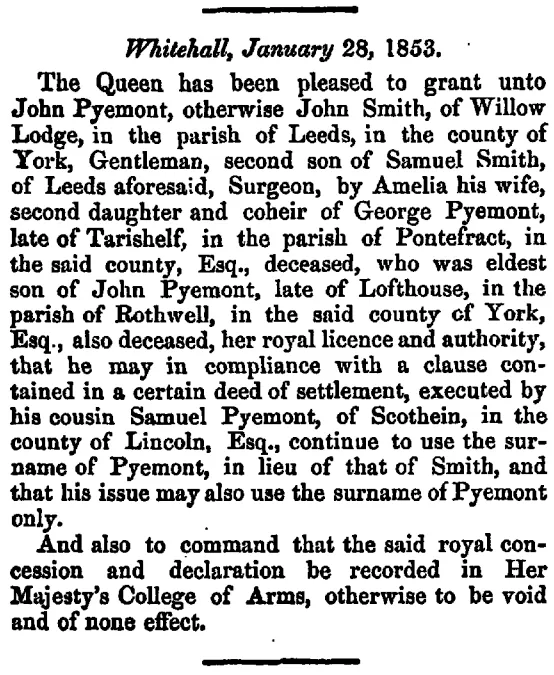
Name changes by royal licence were usually published in the Gazette, the UK’s official journal of record. The quarterly indexes to the London Gazette for 1938–1964 include supplementary indexes to both old and new names. The London Gazette (from 1665), Edinburgh Gazette (from 1699) and Belfast Gazette (from 1921) are available for free on the Gazette's website. The Dublin Gazette (later Iris Oifigiúil) began in 1706, and is available online from 2002.
The Times was the newspaper of choice for the majority who wanted to make a formal announcement of their decision to take a new name, and the newspaper frequently published announcements taken from other sources. Old copies of other national and local newspapers carry such announcements.
The Times Digital Archive can be searched at several subscribing institutions including TNA and the British Library. The book Palmer’s Index to The Times (1790–1905) has a separate heading of ‘Change of Name’ which makes searching easier.
Name change records: Acts of Parliament
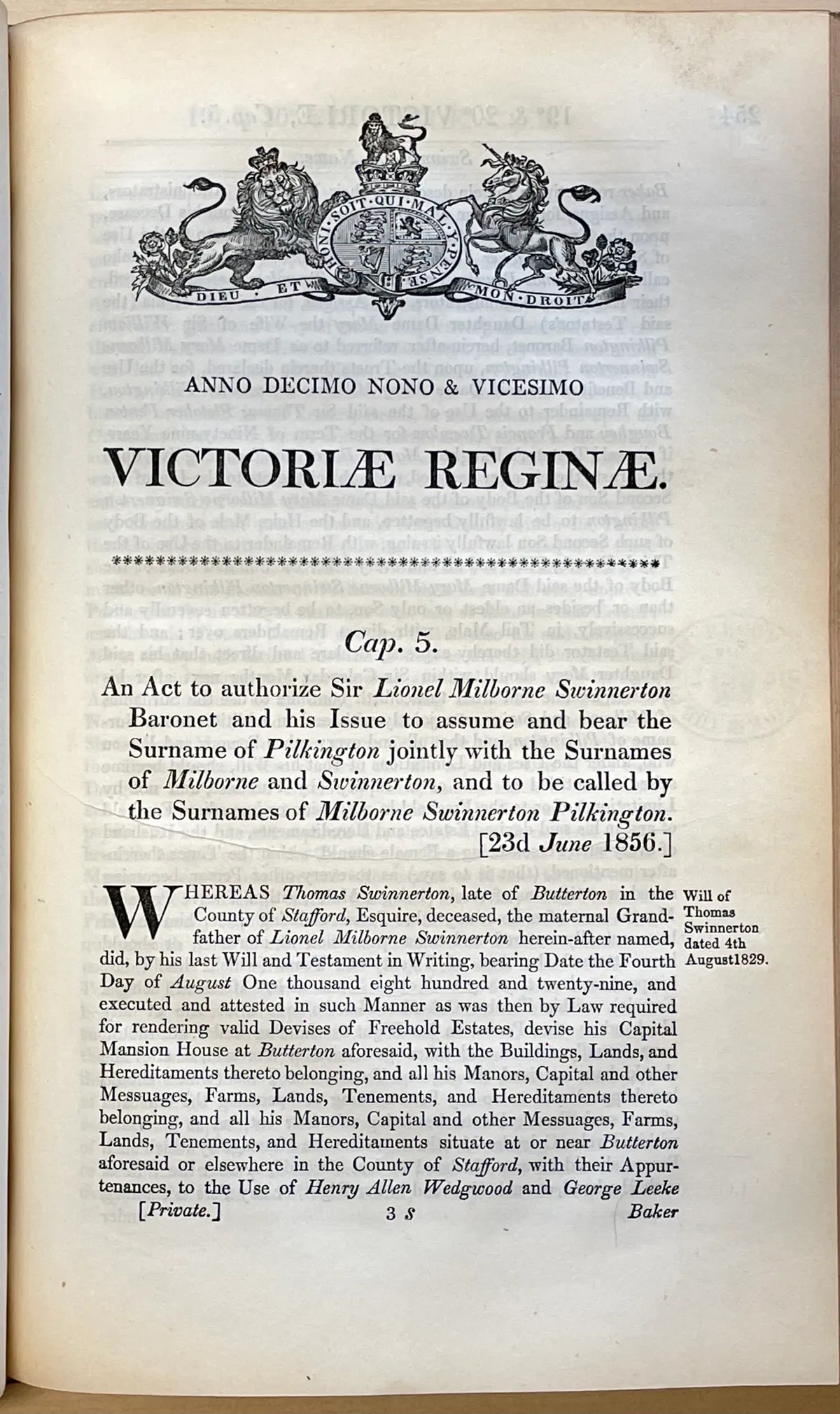
A much less common method of changing name was by Private Act of Parliament. This was very expensive, and although there are many instances of these Private Bills during the 18th and early 19th centuries, since 1907 the process has only been used twice.
From 1798, most Private Acts are published in Local Acts and then in Private Acts (from 1815). Private Acts were sometimes privately printed, although these may just be draft bills which were subsequently amended, rather than the final Act. TNA’s library has some such printed Private Acts, Bills and cases for 1733–1734 and 1737–1743.
To discover if there was an Act, you will need to search the Chronological Table of Private and Personal Acts (1539–2008) to confirm if an Act was passed and in which year, and consult the appropriate volume of the printed series of Acts. The Parliamentary Archives also has records relating to changes of name by Act of Parliament.
Name change records: Deeds poll
A deed poll (plural: ‘deeds poll’) is a legal document executed by a single person, or several people acting jointly, to express an intention. Strictly, it is not a contract because it binds only one party, and expresses an intention and not a pledge. The most common use is a name change via a ‘deed of change of name’, which is usually referred to as a ‘deed poll’.
Although this was usually done before a solicitor or commissioner of oaths, there is no actual need for such formality and any properly executed and witnessed document or statutory declaration is adequate. If a deed poll was drawn up without the aid of a solicitor, other than the document itself there may never have been any further record kept. Even if a solicitor was involved, the record may not have survived, or more recently have been destroyed after five years. A deed poll could also be prepared by an officer of the College of Arms.
In most cases the process of change of name ended there, with the production of the deed, the individuals keeping the document themselves with any solicitor possibly also keeping a copy but for only a few years – deeds poll prepared by the College of Arms are kept in perpetuity.
From 1851 it has been possible to have the deed ‘enrolled’ for safekeeping, but only if it was produced by a solicitor (although this restriction no longer applies). It is estimated that less than 1 per cent of changes of name by deed poll were enrolled. From 1851 to 1903 this enrolment was in the Close Rolls of Chancery, and from 1903 in the Enrolment Books of the Supreme Court of Judicature. The records of these enrolled deeds poll are now held at TNA: those in the Close Rolls are in series C54. The indexes for this period, giving only the former name, are in C275. Those enrolled in the Supreme Court, to 2003, are in J18. More recent enrolments are at the Royal Courts of Justice in London. TNA’s research guide explains how to use the indexes and obtain the records themselves for the enrolments in both the Close Rolls of Chancery and the Supreme Court. From 1914, deeds poll enrolled in the Supreme Court have had to be first advertised in the London Gazette. The procedure, requirements and law in Northern Ireland are similar to England and Wales. Deeds poll do not exist under Scottish law.
See deeds poll throughout the years with our gallery:
